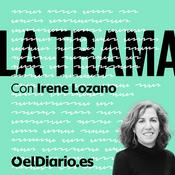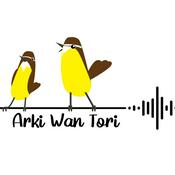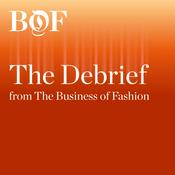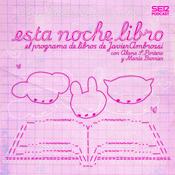Episodios disponibles
5 de 12
- BONUS: A CPHFW panel on shiringa bio-leather, design and fashion’s futureThis bonus episode features a panel discussion that took place at Copenhagen Fashion Week in August 2025. The talk was moderated by Giorgia Feroldi, a fashion journalist writing for the likes of Vogue Italia. The conversation explores our SHIRINGA film which was screened before the conversation, and examines how shiringa bio-leather could be used within the fashion industry. Panelists include Veronica D’Souza, board member of Danish Design Council and sustainable leader; Rebekka Bay, Chief Creative Officer at Marimekko who emphasises the shift to material-first design; Sine Christiane Gerstenberg, a writer, editor and creative advocating for positive industry change; and our founding director (and director of SHIRINGA), Emma Håkansson. The discussion delves into ethics, sustainability, and the need for systemic changes in fashion, highlighting the importance of respecting Indigenous knowledge and addressing the industry's pace. The panel also discusses the importance of material transparency, legislative support, and the potential for a more ethically-driven fashion industry. Lastly, the episode underscores the need for deep knowledge and collaboration within the industry to foster meaningful change. Learn more about shiringa bio-leather and watch our short film See coverage of the exhibition--------50:19
- Fast fashion’s final destination: waste colonialism with OR Foundation’s Sammy OtengIn this bonus episode of Fashion, Really?, we’re looking at where wasted fashion goes, and the fashion industry’s dirty global secret of waste colonialism. Our guest, Sammy Oteng, is a designer based in Accra, Ghana, working as Senior Community Engagement Manager at the OR Foundation. He joins us for a powerful conversation about where our clothes really go when we’re done with them. Spoiler: It’s not all thrift shops and upcycling. Sammy walks us through both the creative ingenuity and the harsh social and environmental realities of Kantamanto Market in Accra, one of the largest secondhand clothing markets in the world. We're talking mountains of discarded clothes, environmental fallout, and a system stacked against the very communities forced to clean up the Global North’s mess. Amongst the dark there is also light: Sammy shares how Ghanaian creatives, traders, and tailors are innovating: reclaiming and reimagining waste into something new. We also unpack extended producer responsibility (EPR), and why it might be one of the few policy tools with real teeth to solve this problem. It’s an episode about power, justice, and what it means to take responsibility for fashion’s footprint. 00:00 Introduction to Sammy Oteng and The OR Foundation 00:59 Defining waste colonialism 02:05 Impact of waste colonialism in Ghana 06:53 Kantamanto Market: a model of sustainability 12:05 Challenges and Innovations in fashion design 19:48 Consumer responsibility and education 26:32 Extended Producer Responsibility (EPR) 38:40 Final thoughts and call to action Actions you can take: Speak Volumes campaign by The OR Foundation Sign our total ethics fashion manifesto Try the rule of 5 challenge More resources: Learn more with the OR Foundation and support their work CFJ’s page on mass consumerism and its impact Read: Consumed: The Need for Collective Change, by Aja Barber Read: Total Ethics Fashion, by Emma Hakansson Follow: Sammy’s design Instagram OR Foundation--------44:52
- What’s next for ethical fashion? recycling, AI, and industry shiftsWe’ve reached the season finale of Fashion, Really?, and our hosts, Emma and Joshua aren’t holding back. From thrifting treasures to tech disruptions, this episode is a ride through fashion’s most pressing issues right now. We’re digging into the industry news shaking things up—from Germany’s breakthrough in poly-cotton recycling to big-name sportswear brands finally walking away from kangaroo leather. We’re also tackling the buzz (and the BS) around AI in sustainability, and looking into the complicated rise of lab-grown leather. Meanwhile, a major legal case puts luxury fashion’s ethics under the microscope. And of course, it wouldn’t be Fashion, Really? without calling out greenwashing. This time, we’re naming names: Leather UK and Odd Muse are both in the hot seat for misleading claims and murky marketing. Despite it all, we’re ending on a high—highlighting signs of real progress in the industry, and holding on to hope for what comes next. Stay tuned for a season break bonus ep! Each of our episodes will be broken down into short and sharp sections, find this episode's breakdown below: 0.00: Welcome! 0.23: First things first: what are we wearing? 3.07: The latest fashion gossip and news… but green 20.07: You’ve got to read this 32.13: Green-wash of the month 49.27: Season wrap-up Book, articles and other things to look at: I asked ChatGPT to find me a responsibly made white T-shirt. Here’s what happened Adidas halts use of wild kangaroo skins in shoes: 'No longer justifiable' eeden Closes €18M Series A Financing to Scale its Breakthrough Textile Recycling Technology TikTok Account: @plzdontbuythat – greenwashing de-influencer. Italian luxury fashion brands continue to be tied to sweatshop scandals, but they’re only getting a slap on the wrist https://www.alexmurrell.co.uk/articles/the-age-of-averageas https://www.alexmurrell.co.uk/articles/the-age-of-average-encore--------50:36
- Brand new vintage... huh? + Orsola de Castro's repair rebellionIn this episode of Fashion, Really?, we’re talking about fashion not just as self-expression—but as resistance to a culture of carelessness and cruelty. Our hosts kick things off with a peek into their own wardrobes, before getting serious dissecting a hard-hitting report revealing that most brands—yes, even ones that seem sustainable—are failing the planet by having no real climate action goals. We are then so pleased to have Orsola de Castro join the conversation, the author and co-founder of Fashion Revolution, who lays down the politics of repair. Why is mending your jeans a form of protest? And what does it mean to reclaim these “lost” skills in the age of overproduction? Plus, Emma and Joshua call out brands playing fast and loose with the word “vintage,” and question Faragamo’s misleading claims about bio-based leather (spoiler: it’s tanned calf skin). If you care about what you wear—and what’s behind it—this episode brings the sugar and spice. Each of our episodes will be broken down into short and sharp sections, find episode one breakdown below: 0.00: Welcome! 0.40: First things first: what are we wearing? 4.04: The latest fashion gossip and news… but green 10.35: You’ve got to read this 17.42: Hear from the expert: Orsola de Castro, co-founder of Fashion Revolution and author, on how craft and repair in fashion can be a kind of resistance. 34.24: Green-wash of the month 42.38: Wrap-up and next time Book, articles and other things to look at: Good On You Fashion Planet Boundary Report Adidas Greenwashing Lawsuit Orsola de Castro, co-founder of Fashion Revolution Loved Clothes Last: How the Joy of Rewearing and Repairing Your Clothes Can Be a Revolutionary Act - Orsola De Castro Orbital by Samantha Harvey Art and Animals by Giovanni Aloi--------43:02
- Pay up, babe: fashion worker wagesFashion, Really? is back with a fresh take on the fashion industry's latest chaos: from half-baked sustainability policies to corporate greenwashing with a glossy finish. This week, we’re catching up after a whirlwind of fashion events and runways, before it’s time to unpack some big moves (and missteps): the EU’s watered-down sustainability regulation, India’s bold decoupling strategy, and whether the fashion industry is actually making a dent in its decarbonisation promises. We’re also joined by the brilliant Delphine Willot from Fashion Revolution, who gets into the thick of it on what it really means to pay a living wage to fashion’s garment workers. And of course, it wouldn’t be an episode without our favourite segment—greenwash of the month. This time, we’re calling out the Natural Fiber Alliance and WWF for dressing up misinformation in eco-friendly packaging. Make yourself comfortable, this episode is jam packed. It’s fashion and politics for people, animals and the planet—unfiltered. Each of our episodes will be broken down into short and sharp sections, find episode one breakdown below: 0.00: Welcome! 1.36: First things first: what are we wearing? 4.53: The latest fashion gossip and news… but green 19.58: You’ve got to read this 31.42:: Our two cents: wages: with guest Delphine Willot from Fashion Revolution 45.47: Green-wash of the month 56.07: Wrap-up and next time Book, articles and other things to look at: The EU has massively watered down what were meant to be landmark sustainability regulations impacting large fashion brands Vogue Business: is fur still a faux pas? Vogue Business: Can India triple the value of its fashion sector while halving emissions? Ecotextile: US secondhand fashion market ‘up 14% last year’ Learn more about next-gen leather materials full 26 page complaint by Tanja Gotthardsen and Forbrugerrådet Tænk (a consumer council think tank) submitted to the Danish Consumer Ombudsman reporting both CPHFW and participating brands for green-washing. PwC’s second annual state of decarbonization report Fashion Revolution Fashion Transparency Index by Fashion Revolution--------57:18
Más podcasts de Arte
Podcasts a la moda de Arte
Acerca de Fashion, Really?
In Collective Fashion Justice’s new podcast, join a New Yorker and an Australian who love fashion but hate what it does to life on our planet, as they gossip about the month’s fashion industry stories and how they impact people, animals and the planet. Quick, critical, a little sarcastic and queer, this is a podcast for people in and into fashion. Who feel like creativity could make our culture better. Who want to talk about the serious problems and have a bit of fun. Because we can.
Fashion, Really? is a podcast from Collective Fashion Justice’s founding director, Emma Hakansson, and CFJ board member, Joshua Katcher. With one brand, four books, a charity and endless lectures on responsible fashion between them, each episode touches on culture, sustainability, ethics, and another idea for transforming fashion that they can’t shut up about.
Sitio web del podcastEscucha Fashion, Really?, El Descampao y muchos más podcasts de todo el mundo con la aplicación de radio.es
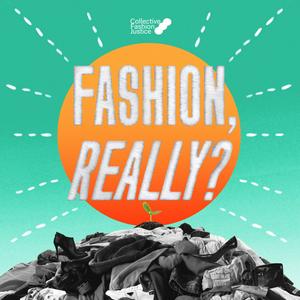
Descarga la app gratuita: radio.es
- Añadir radios y podcasts a favoritos
- Transmisión por Wi-Fi y Bluetooth
- Carplay & Android Auto compatible
- Muchas otras funciones de la app
Descarga la app gratuita: radio.es
- Añadir radios y podcasts a favoritos
- Transmisión por Wi-Fi y Bluetooth
- Carplay & Android Auto compatible
- Muchas otras funciones de la app


Fashion, Really?
Escanea el código,
Descarga la app,
Escucha.
Descarga la app,
Escucha.









